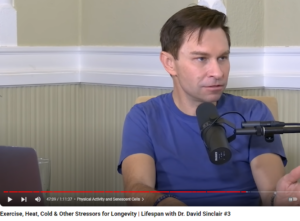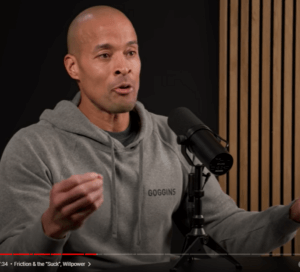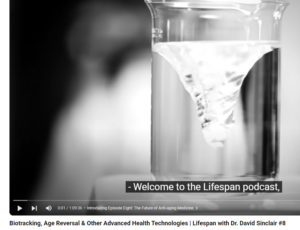Biotracking, Age Reversal & Other Advanced Health Technologies | Lifespan with Dr. David Sinclair #8

In the eighth episode of the “Lifespan” podcast series, hosted by Dr. David Sinclair, a professor of genetics at Harvard Medical School, and his co-author Matthew LaPlante, they delve into the near future of health technologies. This episode focuses on innovations that could significantly extend human lifespans through biotracking, age reversal, and other advanced health technologies.
One key point that stands out is the concept of age reversal. Dr. Sinclair discusses the potential for reversing the aging process, a topic that has transitioned from science fiction to a tangible research goal. Sinclair’s work, along with others in the field, suggests that the aging process is not only stoppable but reversible, thanks to genetic and biochemical interventions.
Age Reversal: Bridging Fantasy and Reality
Age reversal, once a concept relegated to the realms of fantasy, is now at the forefront of aging research. Dr. Sinclair’s work, particularly on epigenetic reprogramming, indicates that we can reset the biological clock of cells, essentially making them younger. This groundbreaking approach uses a combination of three genes known as Yamanaka factors, which, when activated in adult cells, can revert them to a younger state without causing them to lose their specialized functions or become cancerous. This technique has successfully restored vision in mice by rejuvenating the retinal cells, hinting at the potential for human application in the near future.
The implications of this research are profound. Beyond the specific application to eye health, it opens the door to whole-body rejuvenation treatments. Such advancements could dramatically reduce the burden of age-related diseases, including heart disease, Alzheimer’s, and cancer, by not just slowing down aging but by reversing it. This would not only extend lifespan but improve the quality of life, offering a healthier, more vibrant aging process.
The Ethical and Social Implications
As we stand on the brink of potentially extending human life significantly, it’s crucial to consider the ethical and social implications. Concerns range from overpopulation and resource depletion to the inequality of access to these life-extending technologies. However, Dr. Sinclair argues that healthier, longer lives could lead to a more productive society, with individuals having multiple careers and continuing to contribute economically and socially well past current retirement ages. Furthermore, the potential savings from reduced healthcare costs for age-related diseases could be redirected towards solving other global challenges.
Conclusion
The episode underscores the importance of monitoring and understanding our health at a molecular level, utilizing advancements in biotechnology to not only track but also positively influence the aging process. While there are still many hurdles to overcome, the research led by Dr. Sinclair and his peers offers a hopeful glimpse into a future where aging is no longer an inevitable decline but a modifiable aspect of human biology.





